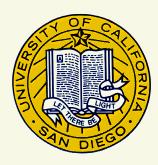Some fellowship applications/progress reports will require the signature of an "institutional official," "contracts and grants officer," or some variation thereof. For graduate students on fellowships, this is always Richard Attiyeh, VC for Research. I'm responsible for getting his signatures on fellowship documents.
On our website, we state that we can only guarantee an on-time signature if you give the document to us 10 days in advance. This strikes many people as onerous, so I wanted to explain why this is: it's a measure for your protection. If you've invested weeks in a fellowship application, I don't want to be the one to tell you that your application can't go forward because your P.I. isn't UCSD eligible. It can take a week or more to sort out these sort of problems, and since it's my job to catch these errors for you, I need time to help you fix them, too.
That said, I realize that most people want to work on their fellowship applications up until the last possible moment.
So today's entry is about how to help you break the 10-day rule.
Here are the common errors I see on fellowship applications. If you correct them as you put together your application, I won't have any reason to send you back if you just happen to give it to me, say, only 3 days in advance.
1. All other signatures before the VC's signature. We're signing off on the administrative aspects, but your Principal Investigator (PI) and department have to sign off on the academics so that we know your research is sound. We cannot sign if other signatures are missing.
2. PI must be UCSD eligible. This means that the faculty member's appointment must be held through UCSD--not Scripps Memorial, as we often see. Here are the acceptable ranks:
Members of the Academic Senate:
Professor - all ranks
Professor in Residence - all ranks
Professor of Clinical X - all ranks but instructor
Research Professor
Professor Emeritus - all ranks
Senior Lecturer and Lecturer with Security of Employment
Acting Professor and Acting Associate Professor
(but not Acting Assistant Professor)
University Librarian (but no other librarians)
Registrar and Chief Admissions Officer
Vice Chancellor
Chancellor
In addition, salaried adjunct professors (but not those with the rank "Instructor") can serve as PIs. Clinical professors with at least a 50% UCSD appointment can also be PIs. When in doubt, check with your proposed PI to learn his/her exact title, and contact me. Exceptions are available, but need to be put into motion well in advance.
3. Unless your PI has a prior agreement with UCSD, no campus matching funds should appear in any budget.
4. Animal/Human Subjects Approval. This does not need to be in place at the time you submit your grant, but it should be in process. Please contact
IACUC directly. No funds will be dispensed without IACUC approval documents, should you receive a grant. School of Medicine fellowship applicants need to submit projects to UCSD's IACUC, not the VA's.
5. Report the correct costs.
Resident fees for UCSD graduate students in 06-07 are $8,668.50. Non-resident tuition is $14,694 + $267 ed. fee. This is all you can generally report as a "direct cost" of education, unless the fellowship provides money for books or lab fees.
6. Submit the whole fellowship application. If we don't have the entire application, we don't know what we're signing.
7. If the fellowship signature page contains the phrase "no per signature", please get it to me at least five days in advance. This means that I can't use VC's signature stamp in his absence, and a VC's schedule, as one might imagine, is rather full.
I hope this is useful to you. I leave you with Rule #8: When in doubt, ask.

